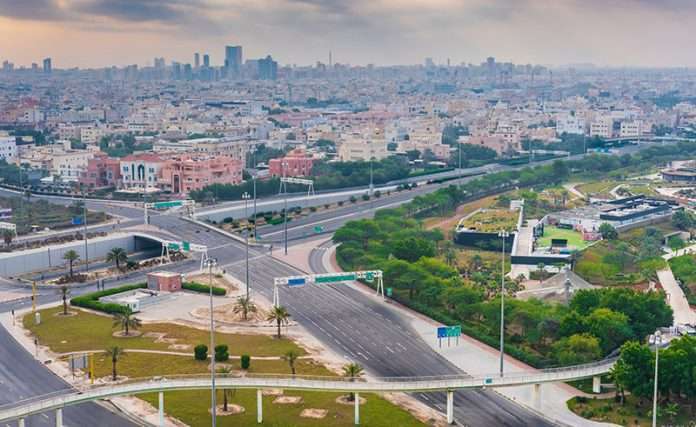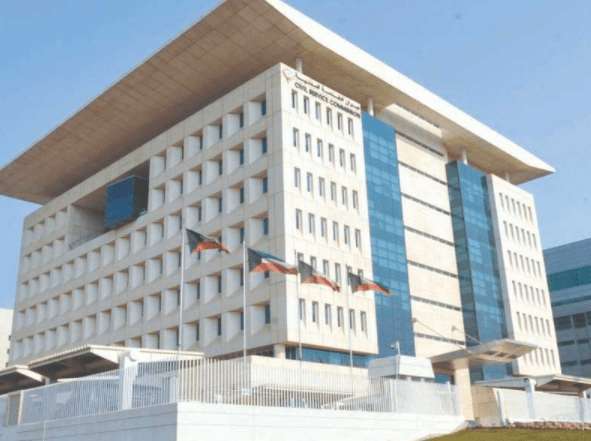Latest News
- 64 Cars Seized And 29,604 Traffic Citations Issued
- Increased Summer Electricity Demand Forecast In Kuwait
- Ethiopia And Kuwait Plan To Discuss Domestic Workers
- Syrian Expat Threatened By Fake Police
- PAM To Provides Shelter For Male Expat Workers
- Unemployed Kuwaitis Keep On Increasing Annually
- Fight Between Two Expats Leads To Stabbing At A Gas Station
- Kuwait Has One Of The Lowest Infection Rates In Its Health Facil...
- 70 Abandoned Vehicles Were Removed In Farwaniya
- Passengers' Dispute Leads To Delay And Legal Action On A Kuwait...
- Sahel App Launches Electronic Ration Card Renewal
- Education Officials Ban Filming And Publishing Student Content
One Year Into Covid-19, Third Curfew Begins…

Kuwait will come under a partial curfew from Sunday, the third such curfew since the start of the pandemic in early 2020. The new curfew, which is slated to come into effect from Sunday, 7 March, will limit the movement of people outside their homes from 5am until 5pm for a month to 8 April.
The curfew hours and the one-month period could be extended or reduced by the authorities depending on the evolving infection rate in the country. The first curfew which lasted from 5pm until 4pm began on 22 March, 2020. With the infection situation showing no signs of abatement, a full curfew was imposed on 10 May of last year that extended until 30 May.
Some of the new measures and revamped old measures during the new bout of partial curfew include:
No walking, no cycling during curfew… Citizens and expatriates will not be permitted to walk or cycle during the curfew period. Violators of this law will be registered as a violator of health requirements, and will be immediately referred to the prosecution for further legal action.
These are part of the stringent measures introduced by the Ministry of Interior (MoI) as part of an integrated plan to set up monitoring mechanisms and distributing security personnel in cooperation with the National Guard and the Ministry of Defense. The security teams will be deployed in areas, and in various sectors where there is high population density to ensure citizens and expats are adhering to the health measures and following the partial curfew in the country.
The only people who are authorized to move during the curfew period are those with the necessary exemption permits provided by the MoI. The law also states that the exemption permit should only be used by the person authorized to do so and whoever violates this condition will have the permit immediately cancelled.
Clear and strict security directives are being implemented in hospitals and clinics with the exit and movement of patients permitted through the use of barcodes that will monitor and control their movements in hospitals and health centers only.
Special MoI teams have also been organized to monitor all diwaniyas, farms, chalets, and other public gathering spaces, to ensure no gatherings take place at these venues. The owners of these places will be held accountable if any illegal gatherings take place at these sites. The owners will be referred to the competent authority, to face penalties including imprisonment or fine of up to KD10,000.
Diplomats included… Ambassadors and staff of diplomatic missions are strictly prohibited from going outside during the partial curfew hours, except on taking special permission from the Ministry of Interior.
Ambassadors and other staff of diplomatic missions will also not be exempt from the decision to restrict walking and cycling during the partial curfew hours.
If a diplomat is found breaking the regulation, legal measures will be taken, including registering his failure to adhere to the curfew and follow the laws and decisions of the country.
Oil sector workers need to be excluded… Kuwait Petroleum Corporation (KPC) has sent the lists of its employees in various oil sector facilities to the Interior Ministry requesting exemption permits, so that personnel can continue working during curfew in oil fields, gathering centers and oil refineries. The Corporation added that the employment rate in operations need to be 100 percent, as all employees in this field are required for unhampered operation of oil facilities in the country.
With regard to administrative staff, KPC said their working hours do not contradict with the partial curfew period as they normally work from 7am to 3pm. The Corporation also stressed that oil companies remain fully committed to the Council of Ministers decision to limit the number of workers in the administrative sectors at 30 percent of total strength at any given time.
No banking… Kuwait Banks Association issued a circular stating that the working hours at local banks will be until 2pm. Banks that are located in industrial and commercial areas of Kuwait, will not operate during evening hours.
The Association added that all banks will abide by the Cabinet’s decision to limit the number of employees in the workplace to 30 percent of the total number of employees within each department in the building.
Inevitable residency status checks and deportations… With the curfew slated to start on Sunday, a tripartite committee, led by Public Authority for Manpower (PAM), Ministry of Interior (MoI), and Kuwait Municipality, has swung into action.
Teams headed by the committee will conduct various checks and inspection procedures at shops, Co-Op societies, food and vegetable selling outlets, and food-order delivery services that are licensed to operate at the time of the curfew, to ensure that the exemption permits mention the names of only their employees.
The committee said the names on the permits should be identical to the names of workers holding residency permits of that employer. In the event that a worker is caught with a residency visa of a business other than the one he works for during the curfew, he will be referred to the Residency Affairs Investigation Department for legal measures to be taken against him, including a penalty of deportation from the country.
And, the exemptions… Even before the curfew comes into effect, the MoI has begun the process of providing exemptions to the curfew to personnel employed in several specific categories of work. The exemption permits are being provided to government agencies and establishments as well as the private sector companies approved by the Ministry of Commerce based on the nature and need of their work during the curfew period, and would allow the holders to travel outside during the partial curfew period from 5pm to 5am each day.
The MoI has provided a list of the personnel employed in specific work categories who will be excluded from the partial curfew that will enter into effect on Sunday, 7 March. Though the exemption list is exhaustive, the MoI does not provide any explanation as to why some of these exempt employees need to be working between 5pm and 5am in the first place.
The list of exempt work categories include: Personnel from the fields of food and consumer goods distribution, maintenance and security, and those involved in continuously providing basic services and resources in the country, will be among the categories exempt from the curfew. The exemption list would be subject to auditing and reassessing by the MoI. The list currently includes: Ministers; Speaker of the National Assembly and members of the National Assembly; People who suffer from chronic diseases, emergency health cases; Kuwaiti Army, National Guard and General Fire Force personnel wearing uniform.
Personnel of the Ministry of Health; All employees in private hospitals and medical laboratories; Engineers of the Ministry of Works and the Public Authority for Roads and Land Transport; Employees of the Ministry of Electricity and Water as well as those working on operational contracts or contractors.
Directorate General of Civil Aviation (DGCA) employees and airline workers as well as Ground service providers at Kuwait Airport; Kuwait Airways and Jazeera Airways employees including pilots, flight attendants, engineers, ground service providers; General Administration of Customs; Companies working in unloading, shipping and customs clearance in ports; Departing and Arriving Passengers. Only one person is allowed to accompany the traveler and to help them with transport and luggage; Workers at the Kuwait Ports Corporation.
Workers in contracting companies contracting with the Ministry of Works and Roads and Land Transport Authority; Workers at Kuwait Mills, Flour and Bakeries Company, as well as Kuwait Catering Company; Water pumping stations located in the areas for all governorates and their workers; Managers and Supervisors of cleaning companies’ projects: Workers of cleaning companies contracted with Kuwait municipality, and those part of maintaining hygiene procedures; Providers of sewage removal services that have contracts with government agencies;
All suppliers of foodstuffs, vegetables and consumables for co-op societies: Drivers and special vehicles transporting vegetables and fruits from Abdali and AlWafra farms to Co-op societies; Workers at Wafra Company for Marketing Services; Laundry staff and gravediggers, even though why gravediggers would be digging graves between 5pm and 5am was not made clear.
SOURCE TIMESKUWAIT
Trending News
-
 Expat Residency Law Amended By Kuwait Ministerial...
20 April 2024
Expat Residency Law Amended By Kuwait Ministerial...
20 April 2024 -
 Ministry Announces Separate Time For Amnesty Seeke...
21 April 2024
Ministry Announces Separate Time For Amnesty Seeke...
21 April 2024 -
 The Ministry Connects With Violators Of Residency...
23 April 2024
The Ministry Connects With Violators Of Residency...
23 April 2024 -
 AstraZeneca Admits Covid Vaccine Can Cause Rare Si...
29 April 2024
AstraZeneca Admits Covid Vaccine Can Cause Rare Si...
29 April 2024 -
 Work Permits Will Be Issued For One Year Under The...
27 April 2024
Work Permits Will Be Issued For One Year Under The...
27 April 2024 -
 3 Expats Caught In Salmiya With 213 Bottles Of Loc...
23 April 2024
3 Expats Caught In Salmiya With 213 Bottles Of Loc...
23 April 2024 -
 Temperature Increases Cause Electricity Load Index...
21 April 2024
Temperature Increases Cause Electricity Load Index...
21 April 2024 -
 Al-Nuer Festival Celebrates Kuwaiti Agriculture Wi...
22 April 2024
Al-Nuer Festival Celebrates Kuwaiti Agriculture Wi...
22 April 2024 -
 Peak-time 'cut-offs' Raise Fears Of An Electricity...
22 April 2024
Peak-time 'cut-offs' Raise Fears Of An Electricity...
22 April 2024 -
 Gulf Electrical Interconnection Project Will Boost...
04 May 2024
Gulf Electrical Interconnection Project Will Boost...
04 May 2024












Comments Post Comment